How To Get Rid of Aphids on Roses
Aphid Control in Your Garden
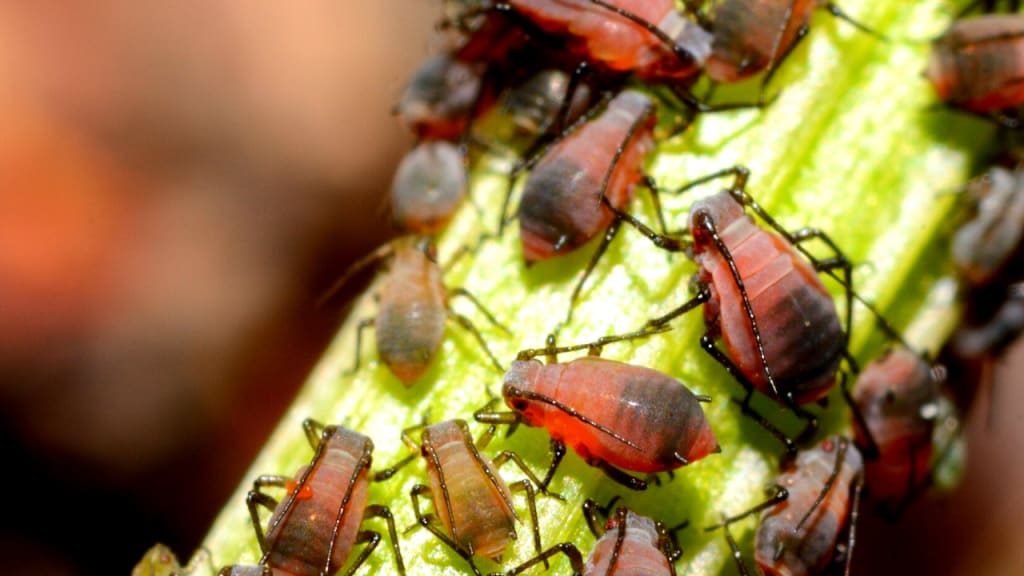
Aphids love to visit our plants and rose bushes every year and can rapidly mount a significant onslaught.
Rose bushes are commonly attacked by Macrosiphum rosae (Rose aphid) or Macrosiphum euphorbiae (Potato aphid), which also affects many other flowering plants.
Controlling aphids on roses is well worth the effort if you want to keep your roses looking great.
Get Them Off Your Roses
Aphids on roses can be pulled off by hand and squished in light cases, or they can be knocked to the ground by tapping the bloom or leaves. They'll be easy prey for the garden's nice guy insect once they're on the ground.
Aphids are large nitrogen eaters, therefore using delayed or time-release (urea-based) nitrogen fertilizers can help reduce aphids on roses. This method of caring for aphid-infested roses avoids a large push of nitrogen to the plants or bushes shortly after feeding, which the aphids prefer for reproduction. Most organic fertilizers are classified as time-release.
Another approach to get rid of aphids on roses is to use lady beetles or ladybugs, especially their larvae, and green lacewings and their larvae; however, this can take some time. In the event of a major attack, this strategy is unlikely to produce the necessary outcomes rapidly enough.
The last resort is to treat the rose bushes and/or plants with insecticide. Here is a list of some of the pesticides that have proven to be effective:
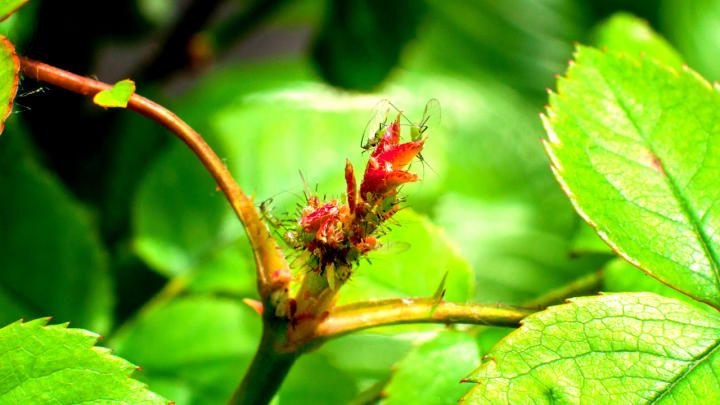
- Acephate (Orethene) - has systemic activity, thus it will migrate through the plant's foliage and reach any aphids hiding within or beneath the foliage.
- Fertilome Rose Spray - Diazinon and Daconil are used in Fertilome Rose Spray to combat both sucking and chewing insects.
- Merit® 75W — a more expensive alternative at first, but highly effective. One teaspoon (5 mL) per 10 gallons (38 L) applied every other week is the suggested application rate for rose bushes, thus a little goes a long way.
- Ortho® Rose Pride® Insect Killer
Safer Insecticidal Soap
Be mindful that most of these last-ditch insecticides may also kill the garden's good guys, thereby exposing your rose bushes and plants to future attacks by other hazardous insects.
Get Rid Of Aphids Organically
Aphids are sap-eating insects that love roses. While most plants can endure a few aphids without suffering permanent damage, if aphid infestations are causing damage or death to your roses, you may need to take action.
Water Your Plants On Daily Basis
Watering your plants on a daily basis is a simple way to prevent aphids away from your plants while keeping them healthy.
Trim Off Brown Or Dying Leaves, Stems, and Petals
Aphids lay eggs in discolored areas of plants on occasion, so clip them off and throw them away to keep future generations of aphids out of your garden. You should also remove any leaves, stems, or petals that have been severely damaged by aphids. Trim any petals or leaves that have microscopic holes in them.
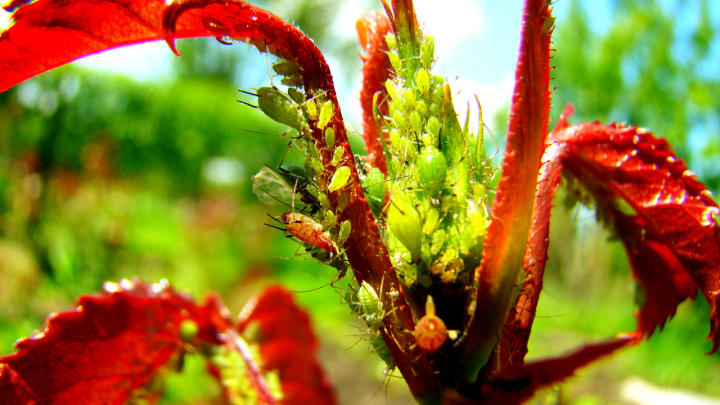
In the Morning, Spritz Your Roses With a Spray Bottle Or Hose
First thing in the morning, spray your roses with a wide-angle hose attachment. Set the hose's nozzle to keep the water flowing as freely as possible without harming your roses. Aphids, while annoying, aren't extremely agile or strong. By hosing down the aphids, you can send them careening into different sections of your garden.
Carefully Water the Undersides Of the Rose Leaves
Aphids prefer to hide beneath the leaves of a rose plant to avoid the sun. Place your nozzle low to the ground and aim it upwards while watering your plant to strike the bottom of the leaves and knock off any aphids hiding there.
To Keep New Aphids From Settling In, Repeat The Process Every Day
For 1-2 weeks, water your roses first thing in the morning. After many days of repeated watering, the aphids should be completely gone or have moved on to another plant. If they're not, you could wish to introduce a predator.
Use The Help Of The Predators Who Are Feeding on Aphids
Buy Some Ladybugs and Release Them Into Your Garden at Night
A gardening or pest control store should have 250-1,500 ladybugs. Refrigerate your bugs for 20-45 minutes before releasing them late at night to reduce the probability of them flying away right away. [5] Ladybugs eat aphids, therefore a few of them can help you get rid of pests.
Place Bird Feeders Throughout Your Garden To Attract Birds
If you don't want more bugs in your garden, this is the only choice to consider. Set up a few bird feeders throughout your garden if you don't want to introduce bugs.
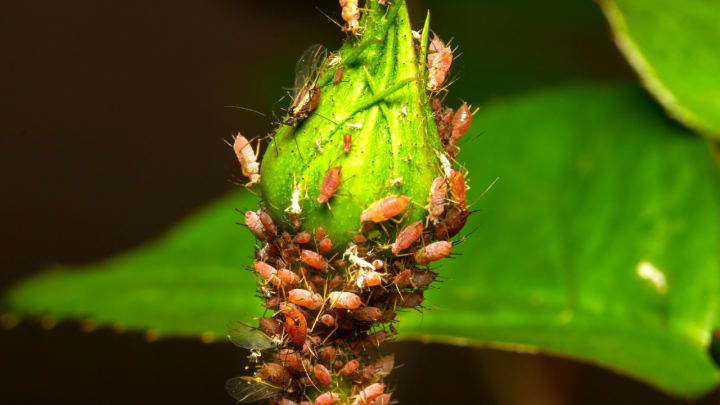
Make your landscape a bird-friendly environment by including birdbaths and birdhouses. Wrens, chickadees, and other small birds all enjoy eating aphids, though it may take a while for them to consume them altogether.
To Attract Predators, Plant Nectar-Producing Flowers Near Your Roses
Plant nectar-producing flowers 2–6 feet (0.61–1.83 m) away from your roses. Predatory insects will be attracted to the nectar and will remain in your garden hunting for prey. Your flowers will start feeding on the aphids if they are close enough to your roses. Natural aphid predators include lacewings, hoverflies, and wasps. They are also drawn to nectar-producing flowers like cosmos and stonecrop.
Make An Organic Repellent For Aphids
Make a Homemade Garlic Spray As a Natural Repellent
With a mortar and pestle, crush a full head of garlic and steep it for 24 hours in 2 cups (470 mL) of boiling water. Fill a spray bottle with your garlic-infused water after straining the garlic with a strainer. Before shaking, add 1 tablespoon (15 mL) of dish soap and close the bottle. Spray each region of your rose plant 2-3 times until it is completely misted.
Spray Your Roses With Neem Oil
Spray your aphid-infested plants 2-3 times using a spray bottle loaded with pure neem oil.
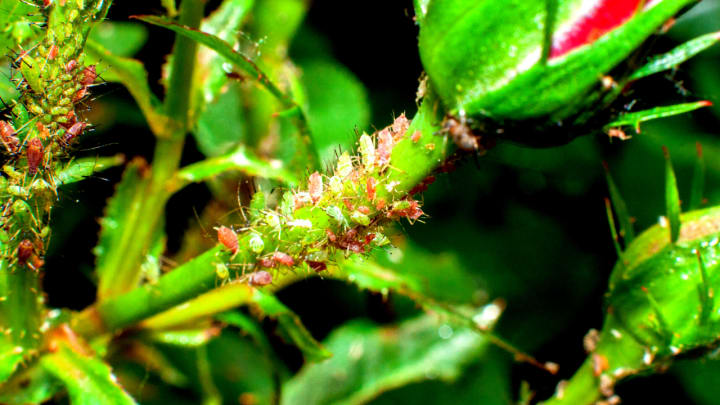
Neem oil is a natural pesticide derived from plant seeds that coat aphids, preventing them from feeding or laying larvae.
For Moderate Infestations, Try a Basic Soap and Water Solution
In a spray bottle filled with warm water, combine 2–3 tablespoons (30–44 mL). Shake the bottle to combine the ingredients, then spray your affected plants in all directions. To avoid oversaturating a small surface area, use the widest nozzle setting on your bottle. The aphids will be harmed by the soap-water mixture and will stay away from your roses.
Conclusion
In combination with these methods, we hope that these techniques will help keep your roses happy and healthy while also having a little impact on the environment.


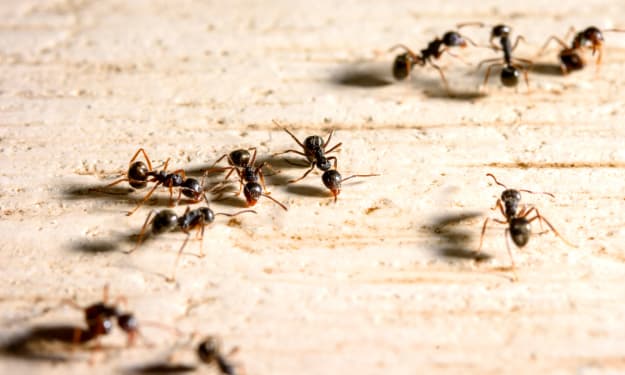



Comments
There are no comments for this story
Be the first to respond and start the conversation.